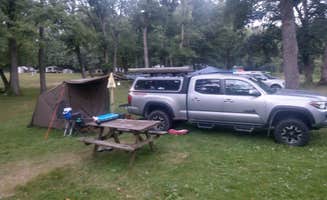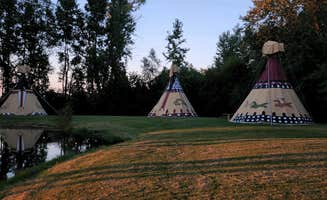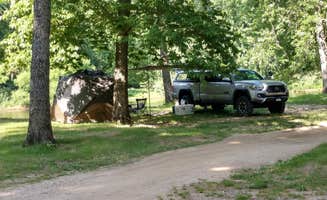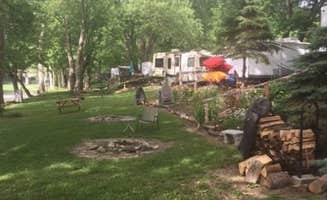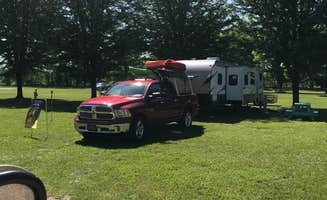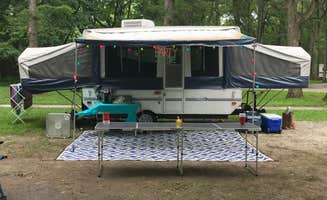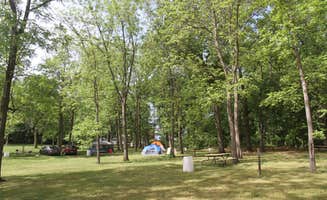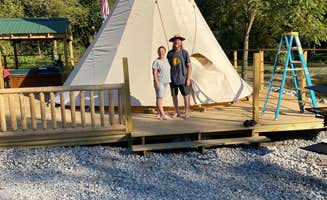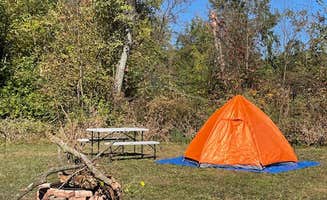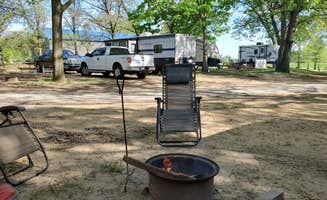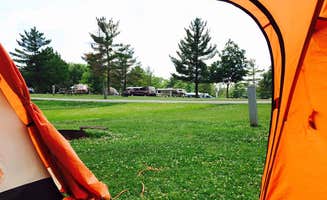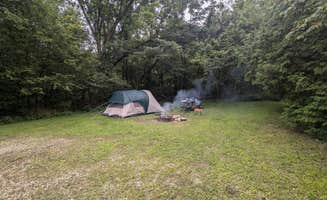Camping near Rochester, Indiana offers a mix of river-based and lake-oriented sites within Indiana's glacial lake region. The terrain is predominantly flat with elevations ranging from 700-800 feet above sea level, featuring numerous kettle lakes formed by retreating glaciers. Winter camping options remain limited with nighttime temperatures frequently dropping below freezing from November through March.
What to do
Hiking and trails: Tippecanoe River State Park features several interconnected trail systems with varying difficulty levels. "There's a firetower, which is fun for the kids and the hike to get there is short," notes one visitor about the park's popular lookout point. The trails connect to natural areas and riverside views.
Water recreation: Mississinewa Lake Campground provides multiple water access points for boating and swimming. "Great mooring area for campers," reports one regular visitor. The lake supports both motorized and non-motorized watercraft with designated swimming areas.
Scuba diving: France Park offers a unique quarry diving experience unusual for northern Indiana. "I scuba dive and this has been a place I grew up diving," mentions a long-time visitor. The park requires divers to register when the dive store is open rather than allowing unlimited access.
Fishing opportunities: Multiple lakes around Rochester provide fishing access with species including bass, bluegill, and catfish. According to an angler at Mississinewa Lake, "Great place to fish. Clean sites, definitely seemed geared towards rv/campers but we fit in with our tent."
What campers like
Peaceful atmosphere: Tippecanoe River Run receives praise for its tranquil setting. "Don't think I've ever stayed anywhere so peaceful. Birds chirping, right on a nature spring, everyone is respectful but laid back," describes one camper who enjoyed the natural soundscape.
Stargazing conditions: The rural setting allows for excellent night sky viewing at several campgrounds. One visitor to Mississinewa Lake noted, "Amazing spot for stargazing," while another at Tippecanoe River Run mentioned "stargazing was better than expected."
Natural features: Quarry views and waterfalls distinguish France Park from other camping options. "The quarry, wow! It was beyond stunning and never what I expected to see in an Indiana park," writes a first-time visitor. The park combines recreational facilities with natural geology rarely found in this region.
Well-maintained facilities: Cleanliness stands out at several campgrounds, particularly at Hoffman Lake Campground where one camper noted, "This is one of the nicest, cleanest and quite campgrounds I've stayed at." The concrete pads and clean bathhouses received specific mention.
What you should know
Seasonal limitations: Most campgrounds operate from mid-April through mid-October with limited winter options. "We camped the end of May & they were just getting going. Spring & late fall would be a good time to visit," advises a Tippecanoe State Park visitor regarding insect activity.
Reservation systems: Some campgrounds have confusing booking procedures, especially for tent campers. At Tippecanoe River Run, "Online reservations is a bit confusing. Map designated tent sites with numbers. When you book campsites they have letters with no map or site pics."
Varying cell service: Connectivity differs significantly between campgrounds. "I have AT&T service and could not use my phone at all, my husband has Verizon and had no problems with cell service," reports a Tippecanoe State Park visitor. At Mississinewa Lake, "I only have one bar with Verizon."
Site spacing concerns: Rising Sun Campground provides riverside sites but with variable privacy. A visitor reported: "I had primitive camp almost all to myself. The site I picked was right on the river. Only issue I had was last night there a few loud locals decided to set up camp next to me at 10pm."
Tips for camping with families
Playground access: Some campgrounds feature dedicated play areas near specific sites. At Tippecanoe State Park, "For the playground, sites 2,3,4,6,&7 have direct access to a playground & you can watch your children from your site."
Swimming options: France Park offers a quarry swimming beach popular with families. "We had an amazing hike, checking out the quarry. The wife spent the day on the beach and swimming in the crystal clear lake," notes a visitor who split activities between hiking and swimming.
Activity planning: Potato Creek State Park provides multiple family-oriented recreation options. "Hiking, biking swimming, fishing, what more could you ask for. We love it here," states one regular visitor. The park maintains paved bike paths suitable for younger riders.
Noise considerations: Family campsites tend to cluster in specific areas. A Potato Creek visitor advised, "We recommend securing a spot in the back sites 230-287 for larger lots and quieter atmosphere. Younger families tend to book up front near the playground and the noise and activities are more robust."
Tips from RVers
Hookup locations: Electric access points at some campgrounds require extra-long cords. At Potato Creek State Park, "Be ready with back up cords, some sites require 75 ft to hook up," advises a regular visitor.
Leveling challenges: Site conditions vary even within the same campground. At Hoffman Lake Campground, "Our site was sloped, but we worked it out," while another visitor specifically noted their "level clean dry concrete pad."
Dump station congestion: Peak checkout times create bottlenecks at sanitary stations. At Mississinewa Lake, "When you are leaving there are 3 dump stations and it can get really really busy and long waits."
Site selection for larger rigs: Not all campgrounds accommodate bigger RVs equally. "The Campground need some updating there are no full hookup sites at all in the park," notes a France Park visitor regarding limitations for larger setups.


